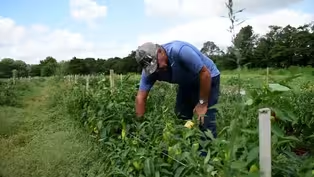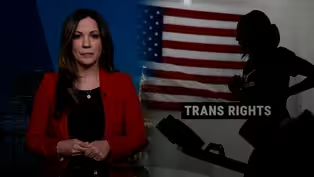NJ Spotlight News
Training to improve police encounters with autistic people
Clip: 2/21/2025 | 4m 44sVideo has Closed Captions
Driver license or state-issued ID could also indicate a person is on the spectrum
People with autism or any other communication disorder often have a difficult time communicating with police during a traffic stop or any other encounter. So on Friday, county and state government leaders gathered to announce new guidance for police officers to better understand how to interact appropriately with those on the spectrum.
Problems playing video? | Closed Captioning Feedback
Problems playing video? | Closed Captioning Feedback
NJ Spotlight News is a local public television program presented by THIRTEEN PBS
NJ Spotlight News
Training to improve police encounters with autistic people
Clip: 2/21/2025 | 4m 44sVideo has Closed Captions
People with autism or any other communication disorder often have a difficult time communicating with police during a traffic stop or any other encounter. So on Friday, county and state government leaders gathered to announce new guidance for police officers to better understand how to interact appropriately with those on the spectrum.
Problems playing video? | Closed Captioning Feedback
How to Watch NJ Spotlight News
NJ Spotlight News is available to stream on pbs.org and the free PBS App, available on iPhone, Apple TV, Android TV, Android smartphones, Amazon Fire TV, Amazon Fire Tablet, Roku, Samsung Smart TV, and Vizio.
Providing Support for PBS.org
Learn Moreabout PBS online sponsorshipGetting pulled over by the police can be a tense, stressful situation.
But advocates say the experience is often even more complicated and frightening for those with autism.
That's because many officers haven't been trained to identify the signs of, or interact with a person who has a communication disorder.
The Murphy administration today rolled out a new program to help law enforcement during those traffic stops, in an effort to prevent potential misunderstandings and escalation.
Senior correspondent Joanna Gagis has the details.
This initiative will help facilitate safer, more effective interactions and enhance understanding between the officers and individuals with unique communication needs.
People with autism or any other communication disorder, often have a difficult time communicating appropriately during a traffic stop or any other police encounter.
So today, county and state government leaders gathered to announce new guidance for police officers to better understand how to interact with them appropriately.
And if we can make it so that our law enforcement officers are equipped with information about the individual they're encountering and the training, as the guidance puts forth to recognize signs of people on the autism spectrum of people and how to respond to them in a clinically appropriate way to ensure that the outcome goes, as we all hope it does, safely and responsibly for everyone involved.
They also announced the rollout of a program that was signed into law in 2023, coinciding with the new guidance.
Individuals with these diagnoses can now voluntarily indicate their diagnosis on their driver's license or their state issued identification through ABC.
That designation on a state issued ID looks like this.
And allows law enforcement to know simply by looking at your ID that you have autism or another communication challenge.
By making these pink code five description cards available.
We at the new Jersey Motor Vehicle Commission are pleased to do our part to help bridge potential communication gaps that may arise between law enforcement and those with an autism spectrum disorder, or communicate disorder.
Any time we can utilize our resources to help improve outcomes for marginalized and other communities in our state, we are happy and honored to do so.
Former Tewksbury Police Chief Tim Barlow is the father of a son who has autism and is now old enough to drive.
He shared how he's worked over the last several years to roll out another similar program called Blue Envelope that started in Connecticut.
The the front has, instructions for the driver, what they should expect during a traffic stop or interaction with an officer.
The back has, instructions for the officer and gives them guidance on how they should act or de-escalate the situation.
What we ask is, if it's for a driver, they place inside the what an emergency contact card, their copy of their driver's license or registration, and the insurance for the vehicle.
Obviously, if somebody is not driving, then we just ask for a copy of their license or identification card, and then they put the emergency contact information inside.
Barlow has met with county commissioners around the state to expand the blue envelope program.
14 have adopted it for are in the process, and three have said they're interested but want some more information before signing on.
Our officers are going to be trained to recognize the signs of autism spectrum disorder, or a communication disorder, with or without the indications on the license or the blue envelope.
Well, that's exactly what we issued today in tandem with no, license designation is guidance to law enforcement.
We will train on to ensure that they both recognize the signs of somebody who has autism or communication disorder and know how to appropriately respond again.
This is both to protect and respect that individual, but also to ensure that officers can be safe when they're doing their jobs.
How it looks will continue to take shape, and we are constantly evolving our training to meet the needs.
This is really a three prong approach, rolling out the changes to driver's license and state IDs and the pink ID cards, along with the law enforcement training.
And then at the same time, we're working with our stakeholders in the community, like Autism in New Jersey and the Speech Language Association to make sure that, you know, individuals across new Jersey who, have a communication disorder or autism spectrum disorder or their their families are aware of these changes and aware of how to access these new resources at the motor Vehicle Commission.
Chief Barlow has worked with Assembly Minority Leader John Demayo and Senator Doug Steinhardt on a bill that would make this blue envelope program available to anyone who walks into any police station or motor vehicle location.
But that bill has not yet moved forward in Flemington.
I'm Joanna Gagis, NJ Spotlight News.
The Change Project: Safe-consumption centers saving lives
Video has Closed Captions
Clip: 2/21/2025 | 6m 13s | Interview: Lilo H. Stainton, health care writer, NJ Spotlight News (6m 13s)
Heat standards advance for NJ workplaces
Video has Closed Captions
Clip: 2/21/2025 | 4m 17s | Bill would require more employers statewide to offer heat protections for workers (4m 17s)
NJ athletic association to keep policy on trans students
Video has Closed Captions
Clip: 2/21/2025 | 1m 20s | New Jersey State Interscholastic Athletic Association oversees school sports (1m 20s)
Providing Support for PBS.org
Learn Moreabout PBS online sponsorship
- News and Public Affairs

Top journalists deliver compelling original analysis of the hour's headlines.

- News and Public Affairs

FRONTLINE is investigative journalism that questions, explains and changes our world.












Support for PBS provided by:
NJ Spotlight News is a local public television program presented by THIRTEEN PBS


